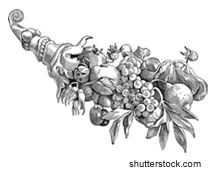by Terence Groth
 More often than not, we Americans today live in an urban or suburban environment that is disconnected from the vocation of agriculture. Our lives are not measured by the cycles of seedtime and harvest. Most of us do not wrestle with nature in order to eat.
More often than not, we Americans today live in an urban or suburban environment that is disconnected from the vocation of agriculture. Our lives are not measured by the cycles of seedtime and harvest. Most of us do not wrestle with nature in order to eat.
We simply select a supermarket, fast-food restaurant, or convenience store and purchase whatever food we want—already prepared, or at least packaged. While we may be thankful for our daily bread, we do not have the appreciation that comes with personally planting and harvesting food as our colonial and Biblical ancestors did—or even our grandparents or great-grandparents.
For them, harvest and thanksgiving were inseparably related. Successful farming and food on the table could not be taken for granted. When these things happened, they nearly automatically inspired thanksgiving.
Most of us won’t get the thanksgiving connection by digging the ground and picking the crops, but we can grow more thankful by digging around in God’s Word and reaping a few reminders of why harvest is always grounds for thanksgiving to the Giver of every good and perfect gift.
Foodstuffs and livestock to satisfy hunger don’t just appear. From where do they come, according to God’s Word?
Gen. 1:29; 9:3
______________________________________
______________________________________
Ps. 65:9–10; 104:14
_____________________________________
_____________________________________
Acts 14:17
_____________________________________
_____________________________________
Nor do such gifts from God nourish and sustain life on their own. Why does the food God provides satisfy our hunger?
Deut. 8:3
_____________________________________
_____________________________________
Although God plentifully provides food and works through it to meet our bodily needs, any farmer can testify that planting and harvesting are hard, frustrating, and sometimes nonproductive work. Even though the farmer is God’s partner in feeding us, he must contend with such adversaries as dry ground, weeds, and devouring insects. Why?
Gen. 3:17–19
_____________________________________
_____________________________________
The difficulties, challenges, and sometimes failures of producing food are constant reminders to farmers and consumers alike that people have an even more fundamental need than satisfying their physical hunger. How is that need described in the following passages?
Eph. 2:1–2
_____________________________________
_____________________________________
Col. 2:13
_____________________________________
_____________________________________
As generous as God is in blessing hungry people with food for their bodies, He is even more generous in the gift He has given to satisfy our spiritual hunger, to rescue us from our spiritual death. How is that need met according to the following passage?
John 6:35, 53–58
_____________________________________
_____________________________________
How generous is our Creator! He not only feeds our bodies, but He gives us His Son as the Bread of life, who brings us to life spiritually and satisfies our deepest needs with His love and forgiveness, the produce of His life, death, and resurrection for all sinners. What motivates God to be so generous with His gifts of food for
our body and spirit?
Ps. 136:1, 23–26
_____________________________________
_____________________________________
Eph. 2:4–5
_____________________________________
_____________________________________
1 John 4:9–10
_____________________________________
_____________________________________
The more we dig around in God’s Word, gleaning His good gifts and love, the more He produces in us a harvest of all kinds of righteousness, including thanksgiving. Harvest and thanksgiving: Through God’s Word, just like our colonial and Biblical ancestors, we discover they just go together!


